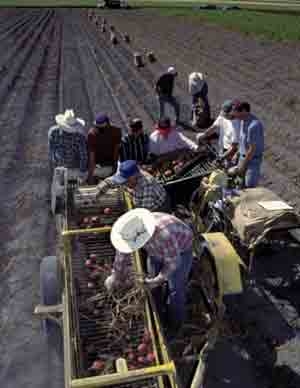
Posts Tagged: Philip Martin
California farmers fear labor shortage, but experts are skeptical

"(Border crossing) is more dangerous because of the drug cartels, our government is doing a better job of enforcing the borders and the Mexican economy is doing better," said Jim Lincoln, a vintner and former president of the Napa County Farm Bureau.
Phil Martin, professor in the Department of Agricultural and Resource Economics at UC Davis, paints a different picture. He estimates the yearly number of farm laborers has remained steady in the last decade at around 800,000 people after it had expanded in the 1990s.
Martin is skeptical of perennial farmworker shortage warnings, finding no signs of diminished crops or fewer workers in a 2007 report, but five years later he says the farming community has hit "a period of uncertainty."
New law aims to reduce farmworker intimidation
An article by Gosia Wozniacka for the Associated Press discusses a new law signed Sunday by Gov. Jerry Brown that aims to make farmworker unionization easier, by automatically certifying union elections if a grower intimidates workers during the election process. The reporter turned to Philip Martin, professor with the UC Davis Department of Agricultural and Resource Economics, for analysis of the law and what differences it could make. Martin told the reporter that it was hard to tell, but that making unionization easier could also put pressure on farmworker wages. "This is a very evolutionary change, not revolutionary," he said.

istock election photos
Immigration reform and enforcement could be costly for farmers

The story was based on research by agricultural economists at UC Davis and the U.S. Department of Agriculture. The report, titled “Labor Trajectories in California’s Produce Industry,” found that changes in the way immigrant labor is regulated in the U.S. would increase the cost of labor for California's $20 billion fresh fruit, nut and vegetable industry.
“California’s produce industry depends on a constant influx of new, foreign-born laborers, and more than half of those are unauthorized laborers, primarily from Mexico,” the UC Davis news release quotes Phillip Martin, a professor of agricultural and resource economics.
“The cost of hiring these laborers will likely rise as the U.S. government ramps up enforcement of immigration laws by installing more physical barriers along the U.S.-Mexico border and requiring more audits of workers’ I-9 employment verification forms,” Martin said.
Read more in the current issue of the ARE Update.